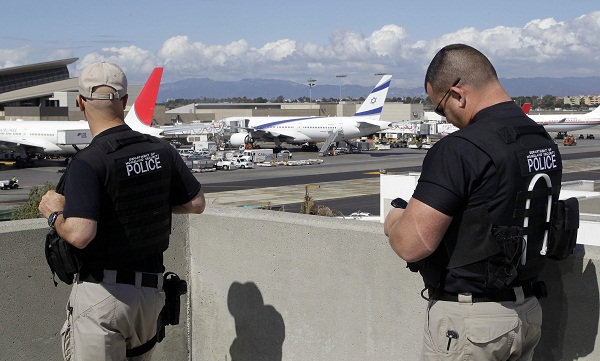
Department of Homeland Security police officers keep an eye on planes at the Los Angeles International Airport Wednesday, October 10, 2012. In an age when travelers have to toss bottled water at airport security checkpoints, what may be most striking about the arrest of a passenger from Japan wearing a bulletproof vest and flying with checked luggage loaded with a cache of weapons, shackles and body bags is that most of it wasn’t illegal on the flight to the U.S. AP/Damian Dovarganes
LOS ANGELES — South Korean security officials screened a man with a bulletproof vest before he got on a flight to Los Angeles, but they never detected a banned smoke grenade concealed in his checked luggage with a cache of knives, handcuffs, a gas mask and other weapons, a U.S. official said Wednesday.
Yongda Huang Harris and his carry-on luggage were thoroughly searched, but authorities found nothing suspicious and he boarded the flight, said a Homeland Security official briefed on the investigation. The official was not authorized to discuss the case publicly and spoke with The Associated Press on condition of anonymity.
Harris, 28, was arrested in Los Angeles last week during a stopover on a trip from Japan after U.S. Customs and Border Protection officers noticed the bulletproof vest. A search of Harris’ checked luggage uncovered the smoke grenade and an array of suspicious items, including leg irons, body bags, a hatchet, billy clubs, a collapsible baton, duct tape and a biohazard suit.
U.S. officials were working with South Korean authorities to determine how the grenade slipped through screening.
Harris is not cooperating with federal officials who are trying to determine why he was headed to Boston with the cache of weapons, authorities said. The smoke grenade was X-rayed by police bomb squad officers, who said the device fell into a category that is prohibited on board passenger aircraft.
Tom Blank, a former deputy administrator at the Transportation Security Administration, said the U.S. will likely look at whether the failure to detect the grenade on a U.S.-bound jet was a one-time lapse or part of a wider security vulnerability.
If the U.S. determines a country’s airport doesn’t meet U.S. standards, it can ask for stronger security measures and even prohibit flights from flying directly to the U.S. from that country.
“This clearly looks like an error. Something slipped through that should not have slipped through,” Blank said of the grenade.
Many of the other belongings authorities say they found in Harris’ luggage — including the hatchet and knives — wouldn’t violate TSA guidelines for property in checked luggage. Also, bulletproof vests and flame-resistant pants like the ones Harris was wearing aren’t listed among prohibited items aboard flights.
There is no indication that Harris, who does not have a criminal record, is linked to a terrorist organization or planned to damage the plane, and it’s not likely a smoke grenade could bring down the aircraft, the federal official said.
But the smoke grenade is banned from planes under the United Nations’ explosives shipping rules. Depending on the conditions when it is ignited, the grenade could fill the cabin with smoke or cause a fire, officials said.
Customs officers believed that the lead-filled, leather-coated billy clubs and collapsible baton might be prohibited by California law, according to an affidavit filed in U.S. District Court.
Rules, or the lack of them, that govern what passengers can do, carry or wear on flights can seem alternately reasonable or unfathomable.
Increased airline security after the Sept. 11, 2001 terror attacks sought to armor flights against terrorist threats, but they can also test credulity for those getting on board.
An intrusive pat-down by security or the discovery of a too-big bottle of tanning lotion can leave a passenger feeling violated, while Harris, outfitted in a bulletproof vest, flame-retardant pants and knee pads underneath a trenchcoat, with a concealed arsenal in his luggage, appears to have triggered no suspicion before arriving in Los Angeles.
Harris has been charged with one count of transporting hazardous materials, an offense that carries a maximum penalty of five years in prison. He made a brief court appearance Tuesday but his arraignment was delayed until Friday and he was ordered held until then.
Harris is a U.S. citizen whose permanent residence is in Boston, though he recently started living and working in Japan, officials said.
Attempts to reach Harris’ family in Boston were unsuccessful. His attorney, Steven Seiden, was unavailable, said spokesman Chris Williams, who described Harris as very intelligent, earning A’s in high school and college calculus.
Harris traveled from Kansai, in western Japan, to Incheon, South Korea, before landing in Los Angeles.
Security at Japanese airports is similar to the U.S. They use metal detectors and X-ray screening on every person and every bag, both checked and carry-on. Airport and immigration officials at Kansai International Airport said Wednesday that airlines are primarily responsible for luggage inspection, but no problematic cases have been reported recently.
An immigration officer at Kansai, Masahiro Nakamoto, said authorities did not report anything suspicious at the time Harris boarded, but arriving passengers are checked more closely than those leaving the country. Spokesman Keisuke Hamatani said Kansai security officials had not reported any suitcases containing the hazardous materials U.S. authorities say they found in Harris’ luggage.
Yasunori Oshima, an official at Japan’s Land and Transport Ministry’s aviation safety department, said there had been no official inquiry or request from U.S. authorities to look into the case, which he said would have been more of a concern if the hazardous materials were brought on board rather than checked.
“The case does not seem to pose any immediate concerns about aviation security measures in Japan,” he said.
Airport police said they do not believe the case constitutes illegal conduct under the Japanese domestic criminal code, but Japan may cooperate at the request of U.S. investigators.